IRGC Accuses LGBTQ Activist Of Leading Human Trafficking Gang
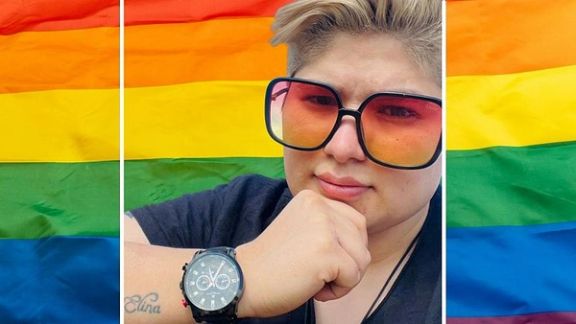
Iran’s Revolutionary Guard says an Iranian LGBTQ rights activist detained since last October has been slapped with new charges of "trafficking Iranian women" to Erbil, in Iraqi Kurdistan.

Iran’s Revolutionary Guard says an Iranian LGBTQ rights activist detained since last October has been slapped with new charges of "trafficking Iranian women" to Erbil, in Iraqi Kurdistan.
The intelligence organization of the IRGC made the accusation in a statement on Monday about Zahra Mansouri Hamdani, also known as Sareh, who was previously arrested on charges linked to an appearance in a BBC documentary on gay rights in Iraqi Kurdistan.
The statement described her "the leader of the biggest gang of Iranian girls trafficking to Erbil,” saying that following months of surveillance, the IRGC intelligence tracked her to the trafficking gangs that had “sold hundreds of Iranian women and girls” to customers in Erbil.
The IRGC also accuses her of promoting homosexuality, gambling and fraud as well as de-stigmatization of illicit sexual relations in cyberspace.
The organization added that her gang was run in collaboration with a man identified as "Alireza Farjadi-Kia" and another woman that goes only by the name "Kati".
She was arrested while trying to cross the border and seek asylum in Turkey on October 27, 2021. She was held in solitary confinement for 53 days, during which, the Revolutionary Guard subjected her to intense interrogations, insulted her identity and appearance, threatened to execute her and to take away custody of her children. On January 16, Sareh was accused of “spreading corruption on earth,” including through "promoting homosexuality”, “communication with anti-Islamic Republic media channels” and “promoting Christianity.”
Rights group Amnesty International appealed to Iran’s Chief Justice Gholamhossein Mohseni-Ejei on January 25, calling for release.
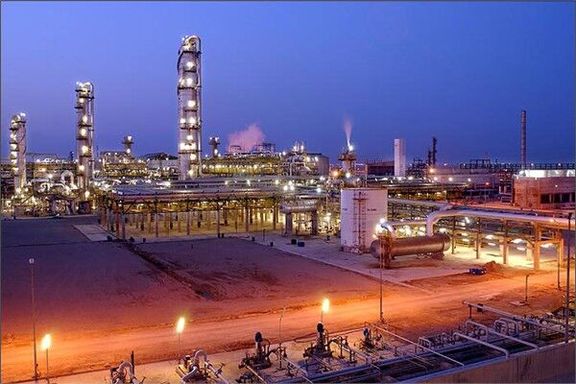
Russian energy giant Gazprom and the National Iranian Oil Company have signed a $40-billion memorandum-of-understanding on the eve of President Putin’s visit.
The current worth of Russia’s contracts in Iran's oil and gas fields is $4 billion, but Iran’s state news agency IRNA says if the new MoU leads to any contracts, Moscow’s total investment will increase 10-fold to $40 billion.
The agreement, as announced by the oil ministry’s Shana news agency, covers development of the Kish and North Pars gas-fields, as well as six oil fields.
It was penned during an online ceremony by the companies’ chief executives on the day Vladimir Putin arrives for a three-way summit with Iran’s President Ebrahim Raisi and Turkey’s President Recep Tayyip Erdogan.
The most significant aspect of the Gazprom-NIOC memorandum for Iran may be access to technology for LNG (liquid natural gas), which Tehran once hoped to access through agreements with western majors, especially Total, that withdrew in the face of United States ‘maximum pressure’ sanctions after 2018.
North Pars has around 33,000 billion cubic feet (bcf) of gas, and Kish gas-field 8,300 bcf. Both are currently at the feasibility stage.
While Iran has the world’s second largest gas reserves after Russia, it has been slow to develop its fields and boost exports in the face of sanctions.
Putin’s visit is being watched close with the expectation of closer links between Moscow and Tehran, boosting trade from just $4 billion in 2021, with both subject to international sanctions and as the Ukraine crisis pushes up global oil and food prices.
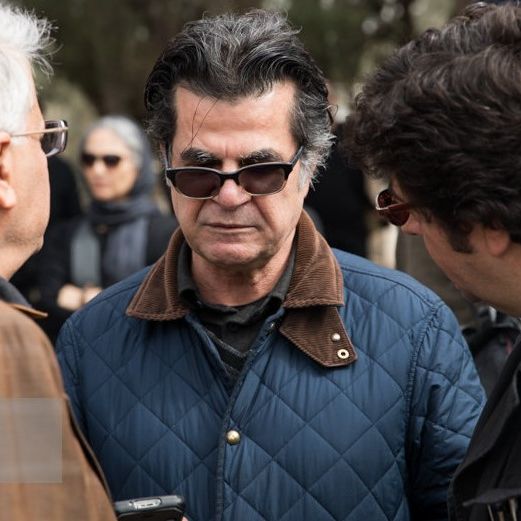
Iran’s judiciary says award-winning Iranian film director Jafar Panahi has been sent to Evin prison to serve his six-year sentence.
Judiciary spokesperson Masoud Setayeshi made the remarks on Tuesday, about a week after Panahi was arrested as he was protesting the detention of two other filmmakers -- Mohammad Rasoulof and Mostafa Alehahmad -- at the prosecutor’s office of the Evin prison.
Setayeshi said that Panahi is sentenced to six years in prison – five years for “conspiracy and collusion against national security” and one year for “propaganda against the system,” adding that the decree is final and binding, according to which he was detained in Evin prison to serve his sentence on July 11.
Panahi, who has won numerous awards, including the Golden Leopard at Locarno Festival, the Golden Lion in Venice, and the Silver Bear at the Berlinale, was once arrested in March 2010 and in December 2010, he was sentenced to six years in prison and a 20-year work ban.
Rasoulof – another prominent filmmaker with several international awards such as the Golden Bear – and Alehahmad – who is known in international film galas for his short works -- were arrested July 8 as part of the Iranian crackdown on the signatories of a collective statement titled “Lay down the gun” issued by more than 100 film industry personalities in the end of May.
Earlier in the week, the Cannes Film Festival, the Berlinale, the European Film Academy and the International Coalition for Filmmakers at Risk also called for the immediate release of the filmmakers. France has also urged Tehran to release the three.
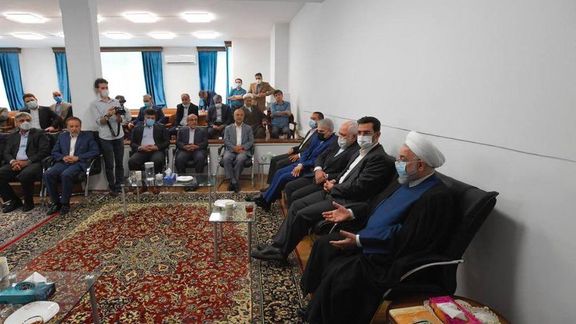
Iran could have ended US sanctions before even negotiations began in April 2021, if parliament had not intervened, former president Hassan Rouhani said Friday.
A brief overview of Rouhani’s remarks were carried by Aftab News website in Tehran.
Rouhani who was meeting with former officials and aides in his office in Tehran on the occasion of Eid Ghadir, said his administration could have removed US sanctions in 2021, in the Iranian month of Esfand (February 21-March 20). He added that “unfortunately” the parliament passed the ‘Strategic Action to Eliminate Sanctions and Defend Iranian Nation's Interests’ bill on December 1, 2020,
The bill, adopted by the hardliner-dominated parliament, boosted uranium enrichment, limited nuclear inspections by the International Atomic Energy Agency (IAEA), demanding the removal of all sanctions.
The February-March date Rouhani mentioned as the time when his administration could have lifted United States’ sanctions predates the start of negotiations on April 7, 2021, in Vienna to revive the 2015 nuclear deal known as the JCPOA.
If Rouhani’s claim is true, it means that his government had already reached an agreement with President Joe Biden’s administration, which had just assumed office, which in turn could mean that some sort of negotiation might have taken place even before Biden took office.
The parliament’s bill that Rouhani referred to was adopted as a reaction to the assassination of Iranian nuclear scientist Mohsen Fakhrizadeh a few days earlier, presumably by Israel, but in fact the outlines of the law had already been proposed on November 4, one day after the US presidential election.
During Rouhani’s eight-year, two-term presidency, hardliners loyal to Supreme Leader Ali Khamenei persistently criticized him for the talks that led to the signing of the JCPOA in 2015, although without Khamenei’s blessing no agreement would have never materialized.
The criticism continued and intensified after former President Donald Trump withdrew from the agreement in May 2018 and imposed sanctions on Iran.
With the election of hardliner Ebrahim Raisi in June 2021, Iran suspended the Vienna talks for five months and when they resumed in November an agreement remained elusive until another suspension in March 2022, which still continues. The prospects for a deal have diminished, as Iran demands the removal of all post-2018 sanctions, including terrorism-related designations.
Rouhani has rarely responded to criticisms by hardliners over the nuclear issue and Iran’s economic crisis since he left office in August 2021.
Although some ‘reformist’ and former politicians and even senior clerics call for an agreement to lift the sanctions and ease hardship for the people, no one dares to say that Khamenei makes all decisions over key foreign policy and nuclear issues.
Rouhani told his former colleagues during the Friday meeting that he hopes the negotiations to revive the JCPOA will succeed. He added, “We have many enemies in the world and in the region and internal disagreements and divisions is not in the interest of anyone. We all have to help the government.”
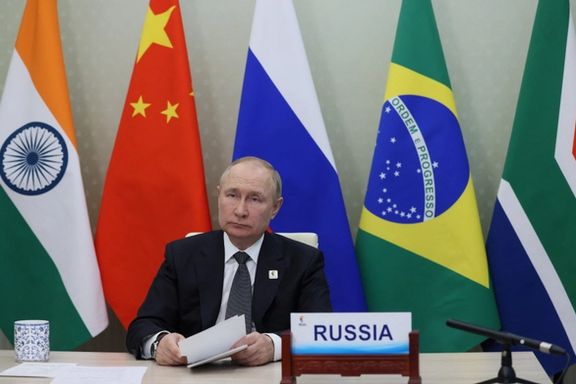
Russia's Vladimir Putin arrives in Iran on Tuesday, in a visit much anticipated by the hardliner government in Tehran and hailed as a major anti-West event.
The formal reason for Putin’s visit is a tripartite summit with his Iranian and Turkish counterparts to discusses Syria, where Tehran and Moscow back Bashar al Assad and Turkey backs the residual rebel forces in the north of the country.
Turkey's President Rcep Tayyip Erdogan also arrive in Tehran and received by President Ebrahim Raisi.
However, Iranian government-owned media has been portraying the visit as a major event to counter the West. Fars news website affiliated with the Revolutionary Guard on Tuesday splashed a headline decaling, “The end of Western monetary and financial hegemony”.
Presumably, Iran and Russia are setting up a mechanism to interchange currencies, but the outline is so vague it is impossible to clearly describe it.
Last week, the US National Security Adviser Jake Sullivan twice warned that Iran might provide military drones to Russia to be used in the Ukraine war. Iran’s foreign ministry tried to deny it, saying Tehran is neutral in the war and will not aid any side.
US State Department spokesperson Ned Price on Monday [July 18] reiterated that Washington is monitoring the situation. “Well, we’ve spoken about our concerns regarding a potential Iranian provision of UAV technology to Russia. We will continue to watch very closely. All of our sanctions remain in force,” he said, adding that such a transaction might violate of host of American and other sanctions on the two countries.
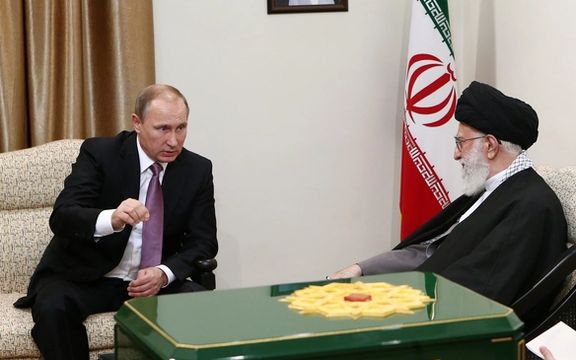
Despite their political alliance, which since the invasion of Ukraine has increasingly taken an anti-Western tone, economic transactions between Iran and Russia remain small.
Bilateral trade rose to $4 billion in 2021, but this is far less than, for example, Russia’s trade with Turkey at $33 billion, while Moscow’s exports to Iran are mainly foodstuffs, which are less vulnerable to US third-party sanctions than other sectors.
Before its costly adventure in Ukraine, Russia was mindful of US third-party sanctions on Iran and there were no major cases of, for example, banking violations.
The specter of an emerging US-backed Arab-Israeli bloc that could tilt the Middle East balance of power further away from Iran has accelerated its clerical rulers' efforts to strengthen strategic ties with the Kremlin.
"Considering the evolving geopolitical ties after the Ukraine war, the establishment tries to secure Moscow's support in Tehran's confrontation with Washington and its regional allies," Reuters quoted an unnamed senior Iranian official as saying.
Sending a clear message to the West that Russia will seek to boost ties with anti-West Iran, Putin will meet the Islamic Republic's most powerful authority, Supreme Leader Ayatollah Ali Khamenei, just a few days after US President Joe Biden visited Israel and Saudi Arabia.
Emboldened by high oil prices after the Ukraine war, Tehran is betting that with Russia's support it could pressure Washington to offer concessions for revival of a 2015 nuclear deal.
Almost a year of indirect talks between Tehran and Washington in Vienna stalled in March, with Iran questioning the US resolve and Washington calling on Tehran to drop extra demands.
But Moscow and Tehran, both subject to US sanctions, have overlapped interests. Iran, whose oil industry has struggled for years under US sanctions, has long relied on exports to China to keep the economy afloat. Since the start of Ukraine war, Moscow has taken away a big chunk of Iran's oil market in Asia.
In May, several reports said that Iran's crude exports to China have fallen sharply as Beijing favoured heavily discounted Russian barrels, leaving almost 40 million barrels of Iranian oil stored on tankers at sea in Asia and seeking buyers.
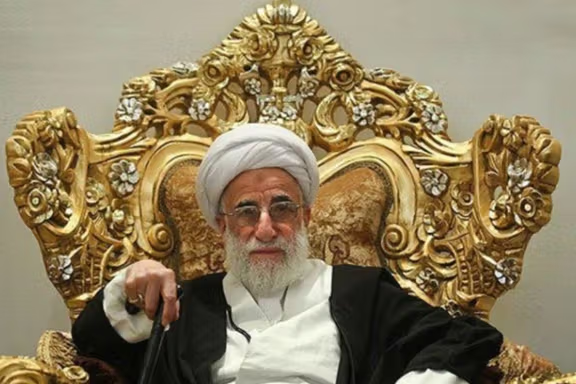
Former Iranian presidential candidate Mohammad Gharazi says Iran's powerful conservative dominated Guardian Council is not accountable for its performance.
Gharazi argued that the Guardian Council, a body tasked with vetting presidential and parliamentary candidates and ensuring that all legislations are consistent with the religious law (Shari'ah) and the country's Constitutional Law is so powerful that politicians have lost the courage to question its behavior.
Gharazi's comment as part of an interview with Didban Iran website comes a few days after Iran's Supreme Leader Ali Khamenei reinstated Ayatollah Ahmad Jannati, 96, and two other clerics for another six years.
Although the Guardian Council's very existence has always contradicted the Iranian establishment's claim about being a democratic system, its decision to disqualify nearly all of pro-reform candidates since 2019 has made it subject to many criticisms from within the system.
The Guardian Council, which was established in 1980, has 12 members, including 6 clerics chosen by Khamenei, and 6 lawyers chosen by the Judiciary Chief and endorsed by the parliament. The 6 clerics do not need the blessing of the parliament. In fact, as the Judiciary chief is also directly appointed by Khamenei, all 12 members of the council are hardliners trusted by the Supreme Leader. The members' term of office is 6 years and every 3 years, half of them may change or be reinstated.
Ahmad Jannati has been the secretary of the Guardian Council since its establishment in 1980. Based on the new order by Khamenei, he can carry on doing his job until he turns 102 in 2028.
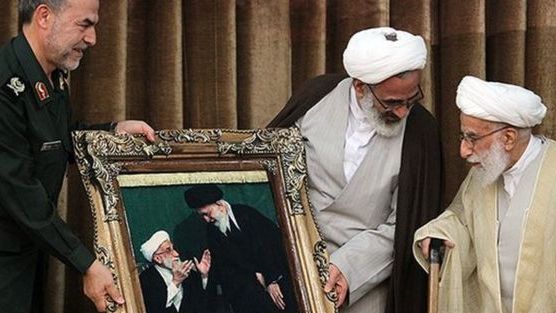
Gharazi said about Jannati's reinstatement: "I hope he lives for 120 years. God knows how long one lives. Who am I to say anything about this?" There are many jokes about Jannati's long life, including one that says he was the witness in Adam and Eve's marriage.
Gharazi, who was Iran's Post, Telephone and Telegraph Minister in the 1980s, said in a damning comment that "Neither the Guardian Council, nor the other councils in the Iranian government have ever done any service to the revolution," adding that the Guardian Council has given big jobs to individuals who have not been able to help the people in any way.
Gharazi said: "When I wanted to become a candidate in the 2017 presidential election, somebody from the Guardian Council told me that I cannot be a candidate as I was over 75 years old at that time. I told him how come a 75-year-old person can be a member of the parliament but cannot run for President?"
The same question was raised in another way following Jannati's reinstatement. Iranian cleric Rashid Davoodi, a graduate of the Qom Seminary who holds a Ph.D. in political science according to his Twitter bio, wrote In a 16 July tweet referring to Jannati’s son, "In 2018 when Ali Jannati was less than 70 years old he was dismissed from his post as an adviser to the Office of the President based on a law that prohibits employing retirement age people. In 2022, his father Ahmad Jannati, 96, was reinstated as a member and the secretary of the Guardian Council for another six years!"
The Guardian Council disqualified all the reformist candidates and even conservative candidates who could be real contestants in the 2020 Majles election, an act that paved the way for sending 290 "revolutionary" hardliners to the parliament. Critics have also lashed out at council for barring reformist candidates from the 2021 presidential elections.